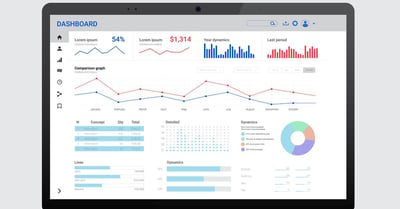
Organic SEO or search engine optimization is one of the most powerful online marketing strategies available to your business. Right now, thousands of people are typing search terms into their phones, tablets, or PCs, hoping to solve a problem.
Each day, people use Google to conduct a stunning 8.5 billion searches, and almost 93% of most website traffic begins with Google Search, Google Images, and Google Maps. The way your business gets “found” by those searchers is by scoring a spot on the first page of Google. You can do this by knowing more, and doing more about SEO than your competitors.
So, what are some top-level SEO techniques? Here are ten tips you can implement to take your SEO for organic traffic to the next level.
1. Improve Your Visitor’s Experience
The longer people spend on your website once they arrive, the better your site is going to perform in the search engines. One of Google’s primary goals is to deliver the most relevant results for every query.
If what is on your page doesn’t match what someone expects to be there, you’re going to have a high bounce rate, and Google will notice. But, if you provide a quality experience on your website with trustworthy and engaging content, you’ll get rewarded instead.
You can improve the user experience by making your site simple to navigate and your posts easy to read. Include plenty of white space, images, and subheaders. Further, your site needs to load fast. Most studies agree that if it takes longer than three seconds to load a page, nearly 53% of mobile users are lost!
2. Optimize for Mobile
Roughly half of all online purchases now take place on a mobile device, and a majority (85%) of Americans own a smartphone. While Google announced several years ago that mobile-first was a priority, the search engine doubled down in March 2020 when it declared that it would use its mobile smartphone user agent as its primary tool to crawl sites. To this day, Google predominantly uses the mobile version of websites for indexing, called mobile-first indexing. Because of this, your business should ensure that its website is entirely responsive and optimize it for the mobile experience.
 3. Pay Attention to Voice Search
3. Pay Attention to Voice Search
Not everyone types their search queries anymore, and more than half of U.S. adults are expected to own some sort of smart speaker in 2022. When it comes to SEO techniques, your website should also be optimized for voice search, which is a bit different from traditional search.
For example, a person is more likely to ask their Alexa devices longer questions like, “what Chinese food delivery near me is open right now?” Many of these answers come from featured snippets, so focus on optimizing for these for better results.
4. Use Topic Clusters to Get Read
Google’s algorithm continues to evolve, and it currently wants to understand the “intention” of its users to provide the best search experience possible. Again, this is where your featured snippets come into play, but you’ll need to focus on more than simply keyword-targeted content.
You’ll need to pay particular attention to “what” the user intends to accomplish with their visit. Do they need a particular question answered, or are they looking to validate a choice?
Instead of just focusing on keywords and phrases for your content, build clusters of content instead that can answer a variety of questions. For example, you might have a pillar page around “e-commerce websites” and then link it to dozens of cluster pages with subjects like “best e-commerce platforms,” “e-commerce pitfalls to avoid,” and “hosting for e-commerce websites.”
5. Focus on Longer-Form Content
Short and shallow content no longer fits the bill of consumers or search engines. Most people want to see a thorough piece of content that includes the answers to all of their questions, as well as some that they didn’t think to ask.
Longer form content (1000-3000 words) also tends to generate more backlinks, which is excellent for SEO. If you’re struggling to write these deep pages, you might consider getting some help. It’s a big job.
6. Don’t Overlook Technical SEO
You might do everything right on the surface, but there are a few things you need to focus on under the hood to supercharge your organic SEO efforts. For example, your entire site should load on HTTPS, giving Google a signal that it is “secure.”
You should also pay particular attention to the title tags and meta descriptions throughout your site. These are what the search engine uses to figure out what is on your page and then help you rank for some of those included keywords.
7. Create an Internal Linking Strategy
Whether you have existing content that you want to give a boost to or new content that you’d like to get noticed by visitors, you can help it out with an internal linking strategy. When we talked about using those content clusters, you’ll link to similar content within your site to give visitors something else to read as well as boost those other pages through your “silo” structure.
 8. Leverage Authority Backlinks
8. Leverage Authority Backlinks
There’s a common misconception that links are no longer effective for SEO. The truth is that spammy and irrelevant backlinks are a terrible idea and will harm your efforts. But Google still likes to see that older and authoritative domains have given your website a vote of confidence by giving it a link.
A linking strategy is tough to execute without some experience and expertise in your corner since the rules can change on a dime. You need a diverse and robust linking strategy to get the best results.
9. Go After Local Search Results
If you’re a local business (most are), you have a unique opportunity in Google and through SEO. Nearly half (46%) of all searches are for local information. This includes people looking for addresses, telephone numbers, hours, and local shops.
You can optimize for local search by claiming your Google Business Profile page and keeping it up-to-date. Further, make sure that information exactly matches what is on your website. When you produce content, include some local qualifiers, such as “plumber in Chicago” or “lawyer in Seattle.”
 10. Measure Your SEO Performance
10. Measure Your SEO Performance
It will be tough to supercharge your SEO if you don’t know where you stand. Tap into your analytics to validate your digital marketing strategy. The data you collect and analyze will tell you if there are any technical issues with your website, what pages are performing well or need some attention, and where there might be opportunities for additional content in the future.
Digital marketing strategies continue to evolve. What works well to rank your website organically today might be different tomorrow or next month. While you’ll need to be ready to adapt, having strong and proven SEO techniques in place will give your website the edge you need over its competitors.
This is a lot to take in for any business owner, which is why it’s valuable to partner with a digital marketing agency that specializes in SEO for organic traffic and other methods of helping your business get noticed and chosen by consumers. Contact Connection Model today to learn more about how our services can help your business achieve the best results possible.
Written By: David Carpenter



